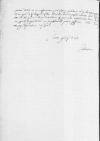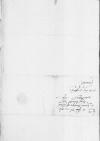List #831
Alfonso de VALDÉS do Ioannes DANTISCUSPassau, 1532-09-11
Regest polski: Valdes zawiadamia Dantyszka, że spełnił jego prośbę i spowodował, że posłańcy, którzy przywieźli konie dla cesarza w imieniu pana Tarnowskiego, zostali hojnie obdarowani. Cesarz 1 września opuścił Ratyzbonę, wczoraj przybył do Passau i natychmiast udał się do wojsk. Krążą pogłoski, że Turcy wycofują się, spaliwszy tylko kilka wsi. Aby się o tym upewnić, cesarz pragnie posłużyć się pomocą Dantyszka. O szczegółach Dantyszek dowie się z listu cesarza, który Valdes umieszcza wewnątrz swojego, aby korespondencja Dantyszka z cesarzem nie wzbudziła podejrzeń. Do uznania Dantyszka pozostawia, czy odsłoni on sprawę przed królem [Zygmuntem I] i czy odpisze wprost do cesarza, czy też za pośrednictwem Valdesa. Valdes spodziewa się zrozumienia ze strony króla [Zygmunta I] i współpracy Dantyszka w obliczu zagrożenia ze strony Turcji. Nie ośmieliłby się prosić go o podobną przysługę w wypadku konfliktu między chrześcijanami. Flota turecka dopłynęła z Królestwa Neapolu do Epiru, po czym na wiadomość, że flota cesarska jest koło Sycylii, wycofała się. Podobno dotarła już do Konstantynopola. Jeśli to prawda, dwór cesarski będzie mógł pojechać przez Italię do Hiszpanii. Valdes przekazuje Dantyszkowi pozdrowienia od Granvelli. Narzeka na posła [angielskiego], który narobił głupstw na podobieństwo Lewickiego – Valdes prześle Dantyszkowi kopię jego odpowiedzi na prośbę cesarza, skierowaną do króla polskiego w sprawie pomocy przeciw Turcji.
| odebrano 1532-09-24 Rękopiśmienne podstawy źródłowe:
Pomocnicze podstawy źródłowe:
Publikacje:
| ||||||||||||||||
Tekst + aparat krytyczny + komentarz Zwykły tekst Tekst + komentarz Tekst + aparat krytyczny
Reverendissimo in Christo Patri et Domino, domino
Cracoviae
Salutem plurimam.
Cum his, qui ex parte
ill(ustrissimi) or ill(ustris)⌈ill(ustrissimi)ill(ustrissimi) or ill(ustris)⌉
domini
De classe Turcica scribunt ad nos ex  UUB, H.154, f. 95v specimen dedit in ea responsione, quam
UUB, H.154, f. 95v specimen dedit in ea responsione, quam
Vale.
Tuus, quicquid est,


